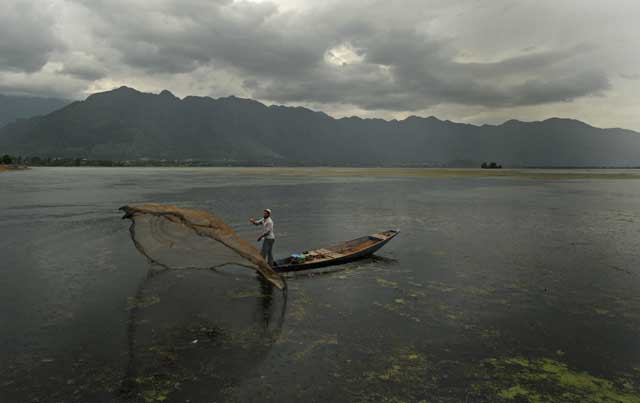Curfewed Night, By Basharat Peer

Early in this extraordinary memoir, the Kashmir-born writer Basharat Peer recounts the tense moments of a cricket match between India and Pakistan in Sharjah in 1986. Pakistan needs three runs to win, and India's Chetan Sharma is about to bowl the last ball of the match to Javed Miandad. Sharma bowls a full toss, expecting to catch Miandad unawares; the quick-thinking batsman whacks it for a six, winning the game for Pakistan. The Valley of Kashmir erupts, cheering Pakistan. Nine-year-old Peer is one of them.
This phenomenon, of Muslims living in India and failing what Norman Tebbitt would have called the cricket test, irritates many in India. India is democratic, unlike Pakistan; Indian women have freedoms their Pakistani sisters can only dream of; Indian universities and businesses accept Kashmiri men and women as students and professionals, but all Pakistan offers is weapons and training to become militants. Why can't Kashmiris realise what's good for them, Indians wonder.
To understand why, read Peer's fascinating personal journey, which shows why the Indian dream is in fact a nightmare for Kashmiris. Peer writes about squandered aspirations, numbing brutalisation, and the shattering of dreams. He talks of a cousin who crosses the border to become a militant (briefly his own boyhood fantasy), and how his family reminds him of those who fight for freedom without violence - Mohandas Gandhi and Jawaharlal Nehru, but also Vaclav Havel and the Dalai Lama - which shapes his own decision to become a writer proud of his Kashmiri identity.
The governing belief in India is that Kashmir (or Jammu and Kashmir, as India calls the region) is an integral part of India, and must remain so; it adds lustre to India's claim to be a secular democracy. There is legal basis to the Indian position, even though its moral underpinnings are lost: at Independence in 1947, the Hindu ruler of Kashmir dithered over deciding whether to join Pakistan or India.
Pakistan sent tribesmen to gain control of Kashmir, and the ruler sought Indian help. India said it would help if Kashmir joined India. The ruler agreed, and the Indian army pushed the Pakistan-supported tribesmen back to what has now become the Line of Control. It promised to hold a plebiscite, a promise never kept. India claims subsequent elections in which Kashmiris have participated have rendered the plebiscite unnecessary; as Peer reminds us, many of those elections have been sham – either rigged, or boycotted. From the 1950s, India imposed puppet rulers in Kashmir, because local leaders did not always toe the line.
In the 1980s the Indian government blatantly rigged elections in Kashmir, disillusioning Kashmiris, who then openly sought azadi, or freedom. The militants – never a monolithic force - behaved abominably: they killed "informers", civilians, blew up buses, and in later years, became so radical as to impose strict Islamic rules on a tolerant, Sufi-inspired syncretic Kashmir, home of Muslims, Hindus, and Buddhists. Indian forces responded with brute force, alienating an entire generation. Peer documents those dreadful two decades, and that context explains the Kashmiri mood, including the current unrest.
Pakistan has exploited the restiveness and encouraged the insurgents, and Peer interviews militants who have crossed the border for training. Pakistan's founding belief has been that Muslims cannot live in peace in the subcontinent "under Hindus", even if they claim to be secular. Pakistanis can't reconcile with the idea of a Muslim majority state being part of the Indian union. What's missing in these polar arguments is the third option, of independence. Many Kashmiris want it, not merger with Pakistan – a point a recent survey conducted at the Royal Institute of International Affairs revealed.
Indian analysts argue that Pakistan won't allow an independent Kashmir to survive even for a day, and would invade. They assert Kashmir is better off in India, even if its rule has been flawed.
Kashmiris disagree, as is clear if you read the stories that Peer tells us. He meets a young bride raped by security forces on her wedding night; he talks to the loved ones of young boys picked up on suspicion of being militants and never seen again (Peer quotes the late Kashmiri poet, Agha Shahid Ali, who wrote of "a shadow chased by searchlight running away to find its body"); he listens to young men who say how they have been rendered impotent after torture by the Indian security forces; and he goes to the camps where Hindu refugees live, seeking out old teachers and friends, seeking a common bond.
Peer's prose is lyrical and moving. He describes the clear blue of Kashmiri skies beautifully. But he also adds the rat-tat-tat of Kalashnikovs, and the explosions of mines and grenades. Peer ends with hope: he describes the resumption of bus service between Srinagar and Muzaffarabad (a part of Kashmir under Pakistani control) which reunites families. Hands seek out to clasp hands, and in those unions, Peer sees the Line of Control fade away.
Subscribe to Independent Premium to bookmark this article
Want to bookmark your favourite articles and stories to read or reference later? Start your Independent Premium subscription today.

Join our commenting forum
Join thought-provoking conversations, follow other Independent readers and see their replies